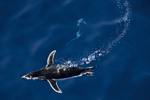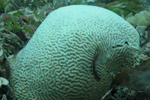
Beach on Peucang Island overlooks the ocean. Photo by: Rhett A. Butler.
A diverse array of institutions have come together to release a new, revolutionary ocean health assessment called the Ocean Health Index. Researchers formed the index in order to gauge the health of the world’s oceans. The index is the result of a huge collaborative effort, including top researchers crossing a diverse range of disciplines such as the National Center for Ecological Analysis and Synthesis (NCEAS) and Conservation International.
“We are very excited about the launch of the Ocean Health Index—the first comprehensive measurement tool for the health of the oceans,” said William Wrigley, Jr., co-founder of the Ocean Health Index. “We know what to do to save the oceans; we just need to convince people to change their behaviors. We can indeed co-exist in a way that benefits both humans and the oceans at the same time.”
So what is ocean health? The Ocean Health Index defines a healthy ocean as “one that sustainably delivers a range of benefits to people both presently and in the future, it also maintains or increases benefits (food and services) in the long term, without jeopardizing the health or function of the web of life that lies in the ocean.”
Social, political, economic and ecological factors contributing to ocean health have all been used to determine the ocean health index. The Index is the first of its kind to combine all of these elements into one quantifiable measure by using ten widely accepted goals, representative of ocean health. Each goal is assigned a score (out of 100) for a particular marine region (all 10 must be met for a country’s ocean to be rated as healthy, but the relative importance of each goal can vary from place to place). Additionally, penalties (scoring penalties) are given to countries that do not plan to sustainably deliver each goal.
Relative marine health is represented by the average score. A high score reflects that humans are utilizing marine resources in a way that still allows the ocean to thrive and provide resources both now and in the future.
The Index draws on numerous existing indices to support data caches—including the Global Competitive Index, Mari-culture Sustainability Index, Tourism and Travel Competitive Index, and World Governance Indicators, as well as information from treaties and international projects such as the Convention on Biological Diversity, Convention on International Trade in Endangered Species and IUCN Red List.
Likely future conditions of ocean health may be estimated as well. Trends (the average percent change in the present status for the most recent 5 years of data), pressures (the sum of the ecological and social pressures that negatively affect scores for a goal) and resilience (the sum of the ecological factors and social initiatives (policies, laws etc.) that can positively affect scores for a goal by reducing or eliminating pressures) can help inform likely future conditions and appropriate management actions.
Oceans are the world’s most valuable asset. They hold 97% of the world’s water, produce over half of the oxygen life needs to survive, regulate the planet’s climate and harbor some of the most important and fascinating biodiversity that exists. Not to mention that oceans are also responsible for supplementing world economy with $3 trillion USD per year. The world’s population is expected to reach 9 billion by 2050; the pressure on our oceans is set to become even more exacerbated.
The Ocean Health Assessment really stands apart from traditional ocean assessments by recognizing the human benefits derived from the world’s oceans and how we may sustainably manage the oceans so that these benefits are retained for future generations. Previous assessments tended to focus largely on the negative impacts induced on the environment through human activity (e.g. an International Program on the State of the Ocean study linked humans to mass extinctions). The Index also aims to provide opportunity in developing and monitoring sustainable management.
Currently, oceans across the globe are being exploited unsustainably. The vast numbers of people who use and depend on the ocean, coupled with poor management, have caused problems such as overharvesting of resources, reduction in biodiversity, degradation of marine habitats and risk of extinction of species, among others. Most scientists believe, however, that there is still enough time for us to act and have a positive impact on our oceans’ health.
Proponents of the Index argue it could be crucial in raising the bar on ocean health.
“The index is backed by pure science and it is our intention to see that it is used to influence people who have the ability to alter policy for the oceans to make the right choices for our future before it is too late,” said Wrigley.
The Index provides policy makers with a tool for identifying areas of improvement, prioritizing those areas, assisting in the development of a plan in order to reach goals, identifying potential trade-offs among uses and measuring the effectiveness of plans and progress toward goals and contrasting it with global ocean health.
Countries’ scores ranged from 36 (Sierra Leone) to 86 (Jarvis Island, an uninhabited island of the U.S. territories in the South Pacific). As expected, developed countries tended to score higher because they have more resources for protection and import seafood etc. whereas developing countries have fewer resources and often see resources, such as fish, plundered for wealthier consumption.
CITATION: Halpern, B S. et al [2012]. An index to assess the health and benefits of the global ocean. Nature.
Related articles
Great Barrier Reef loses half its coral in less than 30 years

(10/01/2012) The Great Barrier Reef has lost half of its coral cover in the last 27 years, according to a new study released today in the Proceedings of the National Academy of Sciences (PNAS). Based on over 2,000 surveys from 1985 to this year the study links the alarming loss to three impacts: tropical cyclone damage, outbreaks crown-of-thorns starfish that devour corals, and coral bleaching.
Penguins face a slippery future

(09/26/2012) Penguins have spent years fooling us. With their image seemingly every where we turn—entertaining us in animated films, awing us in documentaries, and winking at us in commercials—they have made most of us believe they are doing just fine; the penguin’s charming demeanor has lulled us into complacency about their fate. But penguin populations are facing historic declines even as their popularity in human society rises. Overfishing is decimating some of their prey species, climate change is shifting their resources and imperiling their habitat, meanwhile pollution, such as oil spills, are putting even healthy colonies at risk. Now, a young organization, the Global Penguin Society (GPS), is working to save all of the world’s 18 penguin species by working with scientists, governments, and local communities.
Coral diversity off Madagascar among the world’s highest

(09/24/2012) The western Indian Ocean, especially the waters between Madagascar and mainland Africa, may be among the world’s most biodiverse for coral species, according to a new study in PLOS ONE. Conducting dive surveys in the region for nearly a decade, David Obura with the Coastal Oceans Research and Development in the Indian Ocean (CORDIO) identified 369 coral species in the western Indian Ocean and predicts there may be nearly another 100 unidentified. If so, this would make the region as biodiverse as the Great Barrier Reef, but still behind the Coral Triangle which has over 600 species.
Coral reefs in Caribbean on life support
(09/11/2012) Only 8 percent of the Caribbean’s reefs today retain coral, according to a new report by the International Union for Conservation of Nature (IUCN). With input and data from 36 scientists, the report paints a bleak picture of coral decline across the region, threatening fisheries, tourism, and marine life in general.
Deforestation is killing Madagascar’s coral reefs
(09/05/2012) Sediment carried by rivers draining deforested areas in Madagascar is smothering local coral reefs, increasing the incidence of disease and suppressing growth, report new studies.
Coral calcification rates fall 44% on Australia’s Great Barrier Reef
(09/04/2012) Calcification rates by reef-building coral communities on Australia’s Great Barrier Reef have slowed by nearly half over the past 40 years, a sign that the world’s coral reefs are facing a grave range of threats, reports a new study published in the Journal of Geophysical Research – Biogeosciences.